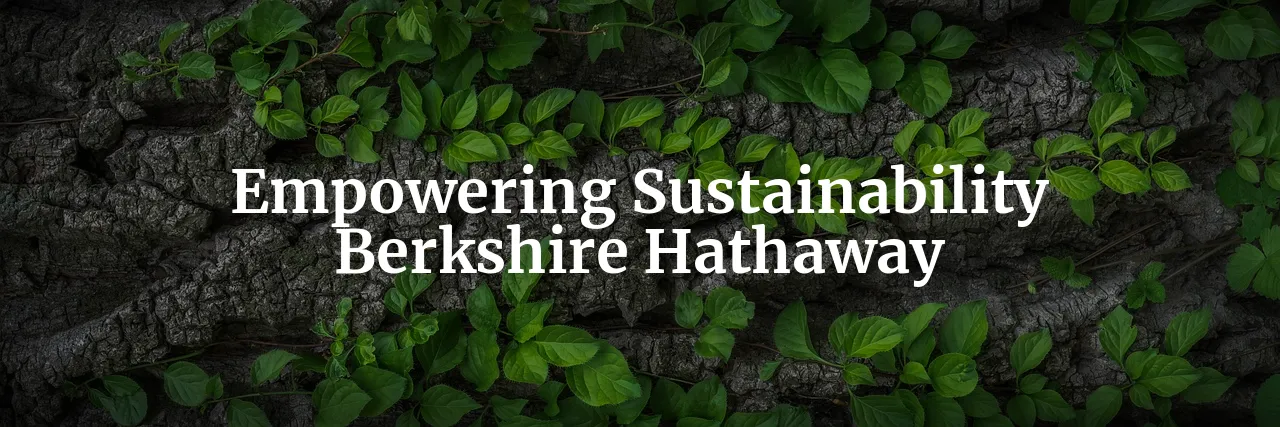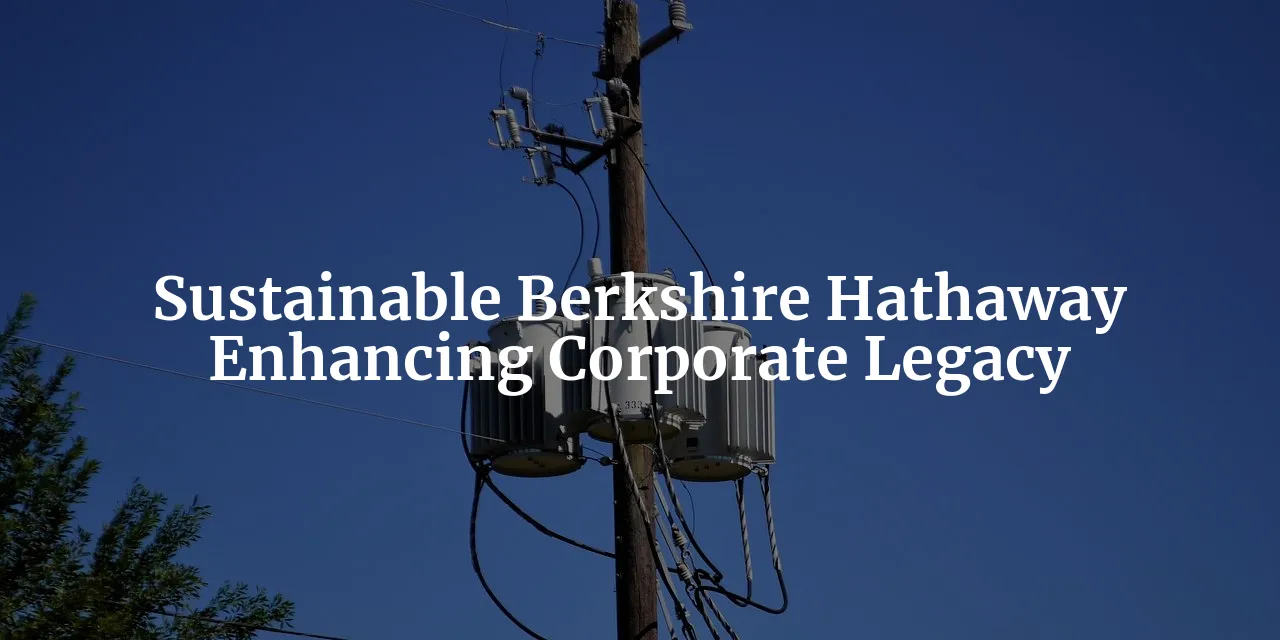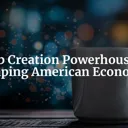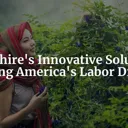Tags: GEICO / BNSF / McLane / FotL / Marmon / PCC / Clayton Homes / ESG
This fanpage is not officially affiliated with Berkshire Hathaway: Disclaimer
Calling all Berkshire Hathaway shareholders and aficionados! Dive into an insightful exploration of the conglomerate's sustainability efforts across its diverse subsidiaries. From GEICO's environmental safety programs to Clayton's sustainable home building initiatives, discover how these practices not only contribute to a more sustainable future but also enhance the conglomerate's standing in an increasingly eco-conscious market landscape. Join us in recognizing the strategic imperative and potential impact of sustainability on investment value and corporate legacy. Let's work together to ensure Berkshire Hathaway continues to set a high standard for responsible corporate behavior and environmental stewardship.

Introduction
Berkshire Hathaway, a name synonymous with investment acumen and corporate success, has evolved from its humble beginnings as a textile company into a global powerhouse ↗. Under the stewardship of Warren Buffett, it has grown into a multinational conglomerate, boasting a diverse portfolio that spans across industries such as insurance, utilities, rail transportation, and manufacturing ↗. In today's era, where sustainability has become a clarion call for corporations worldwide, addressing global challenges such as climate change, resource scarcity, and social inequality is not just ethical but essential for long-term profitability and corporate reputation.
The purpose of this article is to shed light on the sustainability efforts across Berkshire Hathaway's subsidiaries, underscoring the conglomerate's commitment to environmental, social, and governance (ESG) practices. For shareholders, these efforts are not just a matter of moral pride but are crucial in assessing the potential impact on investment value and the conglomerate's standing in an increasingly eco-conscious market landscape.
This exploration will delve into the diverse industries under Berkshire Hathaway's umbrella, including insurance, rail transportation, and manufacturing, among others ↗. By highlighting the conglomerate's commitment to sustainable practices, this article sets the stage for a detailed examination of how each subsidiary not only navigates but also contributes to overcoming some of the most pressing environmental challenges of our time.
Environmental Safety Practices at GEICO
GEICO is a key subsidiary of Berkshire Hathaway with around 40,000 employees ↗. The company is a leading auto insurer in the United States, which exemplifies the conglomerate's commitment to sustainability through its Auto Repair Xpress program. This initiative mandates that auto body repair shops participating in the program complete an environmental and safety training program. This requirement ensures that at least one person at each facility is well-versed in best practices for safety and pollution prevention, as outlined by S/P2, a provider of online safety and pollution prevention training specific to the auto body repair industry 1.
In recognition of its leadership and commitment to sustainability, GEICO was honored with the Excellence in Safety and Pollution Prevention Award from S/P2 in 2015. This accolade not only highlights GEICO's dedication to environmental stewardship but also its role as a pioneer in promoting safer and more sustainable practices within the auto repair industry.
Since 2003, GEICO has fostered a long-standing partnership with S/P2, integrating the S/P2 Collision online training into its Auto Repair Xpress program. This collaboration underscores GEICO's ongoing commitment to environmental education and its proactive approach to addressing the challenges of pollution and workplace safety. Moreover, the S/P2 Claims Staff course further exemplifies this commitment by preparing GEICO's field claims staff to navigate on-the-job hazards effectively, ensuring that all newly hired claims staff complete the S/P2 training before entering work areas.
GEICO's pioneering support for S/P2 training has not only set a high standard for excellence within the industry but has also had a broader impact, with the training being adopted by automotive educational programs, automakers, and other insurers. This wide-reaching influence showcases GEICO's leadership in promoting safer facilities for employees and clients, as well as its significant contributions to environmental protection.
In the words of S/P2 President Kyle Holt, "Their standard for excellence contributes to safer facilities for employees and clients, and exemplifies protection for our environment." This statement encapsulates GEICO's role as a beacon of sustainability within the auto insurance industry, demonstrating how corporate responsibility and environmental stewardship can go hand in hand to create a safer, cleaner world for future generations.

BNSF's Path to Sustainability
In an era where environmental consciousness is not just a choice but a necessity, BNSF Railway, also a Berkshire Hathaway company ↗, has taken significant strides towards sustainability. At the heart of BNSF's environmental strategy is a bold commitment to achieve a 30% reduction in greenhouse gas (GHG) emissions by 20303. This goal is not just ambitious but also a testament to the company's dedication to leading the freight transportation sector towards a more sustainable future.
Freight trains, as a mode of transport, already present a more fuel-efficient and environmentally friendly option compared to their highway counterparts. They are 3-4 times more fuel efficient and can reduce greenhouse gas emissions by up to 75%3. In 2022 alone, BNSF customers were able to reduce their carbon emissions by more than 23.9 million metric tons, showcasing the significant impact of choosing rail over road transport3.
Investing in clean technologies is another cornerstone of BNSF's sustainability efforts. The company has made a considerable investment in acquiring over 300 Tier 4 locomotives since 2015, which are the newest and cleanest-burning locomotives in North America3. Additionally, BNSF is pioneering the testing of a 100% battery-electric locomotive and exploring the potential of hydrogen fuel cell locomotives. These initiatives not only underscore BNSF's commitment to reducing emissions but also highlight its role as an innovator in the rail industry.
Waste management and recycling are integral parts of BNSF's environmental initiatives. The company recycled approximately 2.8 million railroad ties, 1.2 million pounds of batteries, and 2.6 million gallons of lube oil in 20223. Such efforts demonstrate BNSF's comprehensive approach to sustainability, extending beyond emissions reduction to encompass a broad spectrum of environmental stewardship activities.
To further reduce emissions and noise, BNSF has implemented the use of electric cargo-handling equipment at their California intermodal facilities3. This initiative, along with the operation of 35 battery-electric yard trucks and the plan to add another 50 in the next two years, exemplifies BNSF's commitment to leveraging technology for environmental benefits.
Innovative fuel strategies also play a crucial role in BNSF's sustainability journey. The company is testing a B20/R80 blend of fuel for locomotives, aiming to reduce carbon emissions by up to 20% by 20303. The exploration of hydrogen as a fuel source, through the piloting of a demonstration locomotive, further illustrates BNSF's forward-thinking approach to sustainability.
BNSF's holistic strategy extends to improving freight fluidity and making strategic investments in track infrastructure. By looking at their network comprehensively, BNSF aims to identify where investments can yield the most significant environmental benefits, thereby enhancing the sustainability of the entire freight transportation ecosystem.
McLane's Investment in Sustainability
McLane Company, another prestigious Berkshire Hathaway subsidiary, has positioned itself as a leader in corporate responsibility with a strong commitment to environmental, social, and governance (ESG) principles4. This commitment is not just about adhering to regulations but about making a positive impact on the planet and its people.
A significant marker of McLane's dedication to sustainability is its investment of over $230 million in energy-efficient automation and equipment4. This substantial financial commitment underscores the company's belief in the importance of integrating sustainable practices into its operations.
The installation of eco-friendly mud flaps on 3,800 tractors and 4,800 trailers is a testament to McLane's attention to detail in its sustainability efforts4. Furthermore, the company's exploration of electric yard trucks and participation in fuel efficiency tests with autonomous driving technology reflect its willingness to innovate and adopt new technologies for a greener future.
McLane's sustainability initiatives have led to impressive annual environmental savings, including a reduction of 140K tons of carbon dioxide in greenhouse gases, 273M gallons of water, and 58M kilowatts of electricity4. These figures not only highlight the company's impact on reducing environmental footprints but also set a benchmark for others in the industry.
By participating in innovative tests and initiatives, McLane has not only demonstrated its proactive approach to sustainability but has also contributed to the broader conversation on environmental responsibility within the corporate sector. The tangible environmental benefits resulting from McLane's investments are a clear indication of what is possible when a company commits to making a positive impact.
Thus, McLane's role within Berkshire Hathaway and its broader impact on sustainability efforts are exemplary ↗↗. Through significant financial investments, innovative technologies, and a comprehensive approach to reducing its environmental footprint, McLane is paving the way for a more sustainable future in the corporate world.

Fruit of the Loom's Environmental Goals
In the tapestry of Berkshire Hathaway's subsidiaries, Fruit of the Loom emerges as a vibrant thread, weaving ambitious environmental goals into the fabric of its operations. The company's commitment to the Science Based Targets initiative (SBTi) is a testament to its dedication to combat climate change, with a bold aim to limit temperature rise to less than 1.5 degrees Celsius by 20305. This initiative is not just a pledge; it is a comprehensive strategy designed to weave sustainability into the very core of Fruit of the Loom's business model.
The company has set forth clear, measurable objectives to reduce absolute scope 1 and 2 GHG emissions by 50%, and scope 3 GHG emissions by 30% by 2030. This proactive approach to mitigating climate change impacts demonstrates Fruit of the Loom's understanding of its environmental responsibilities and its commitment to leading the textile industry towards a more sustainable future. The planned increase in annual sourcing of renewable electricity from 40% in 2018 to a goal of 100% by 2030 underscores a significant shift towards clean energy, showcasing the company's commitment to reducing its carbon footprint.
Progress is already visible, with a 32% reduction in scope 1 and 2 emissions since their base year, marking a significant stride towards their ambitious goals. Furthermore, the achievement of 61% global electricity from renewable sources in 2022 through on-site renewables and the purchase of Renewable Energy Certificates (RECs) illustrates not only progress but also the potential for rapid advancement in sustainability within the corporate sphere.
Moreover, these efforts are part of a broader environmental goal within Berkshire Hathaway, which has seen a 13.8% reduction in water intensity since 2018, surpassing their goal of a 10% reduction by 2030. This achievement highlights the conglomerate's overarching commitment to sustainability and environmental stewardship.
Fruit of the Loom's environmental goals are not just ambitious; they are necessary. In a world grappling with climate change, the company's efforts set a precedent within the textile industry, demonstrating that sustainability and business success can go hand in hand. As shareholders and consumers, witnessing such strides towards environmental sustainability offers a beacon of hope and a model for responsible corporate behavior ↗.
Marmon's Sustainable Operations

At the heart of Marmon Holdings lies a mission that transcends the conventional boundaries of business operations ↗. Marmon's commitment to sustainable income growth, while upholding the highest ethical and environmental standards, sets a remarkable example of corporate responsibility within the vast Berkshire Hathaway empire6. The company's dedication to integrating climate change, natural resource use, air quality, and waste management into its governance and risk management processes signifies a holistic approach to sustainability.
The appointment of a Sustainability Officer and the establishment of a management-level sustainability committee are pivotal steps that underscore Marmon's leadership in sustainability. These actions not only demonstrate a structured approach to environmental stewardship but also highlight the company's commitment to embedding sustainability into its corporate DNA.
Marmon's regular environmental audits for regulatory compliance and progress assessment are a testament to its accountability and dedication to continuous improvement. These audits serve as a critical tool in measuring the effectiveness of Marmon's sustainability initiatives and ensuring that the company remains on track to meet its environmental objectives.
Furthermore, Marmon's focus on sustainable operations to meet customer goals and enhance community well-being reflects a deep understanding of the interconnectedness of business success and societal progress. This perspective is crucial in today's world, where the impact of corporate actions on communities and the environment is under increasing scrutiny.
Examples of sustainable practices within Marmon's operations include innovative waste management solutions, energy efficiency projects, and initiatives aimed at reducing water usage. These practices not only contribute to environmental sustainability but also offer a competitive advantage by improving efficiency and reducing costs.
Marmon's role within Berkshire Hathaway and the conglomerate's overall sustainability strategy is a clear indication of the shifting paradigms in the business world ↗. The company's sustainable operations are a beacon of progress, demonstrating that ethical and environmental considerations are not just add-ons but integral components of business success in the 21st century. Marmon's journey towards sustainability is a compelling narrative of how visionary leadership and a commitment to ethical principles can drive meaningful change, setting a benchmark for others in the industry to follow.
PCC's Commitment to Sustainability
Precision Castparts Corp. (PCC), a renowned name in the manufacturing world ↗, stands as a beacon of environmental stewardship and sustainability. PCC's unwavering commitment to promoting sustainability and protecting the natural environment is not just a policy but a core aspect of its operational ethos 7. This commitment is evident in how PCC operates its facilities in an environmentally responsible manner, focusing on reducing its environmental footprint through innovation and technology.
At the heart of PCC's sustainability efforts is a multifaceted approach that includes maximizing recycling, utilizing nontoxic substances, minimizing waste, and conserving energy and water resources. These practices are not just good for the planet; they set a standard for the industry, showcasing how manufacturing can be both efficient and environmentally friendly. PCC's operations are in strict compliance with environmental laws and regulations, demonstrating its dedication to responsible operations.
A groundbreaking initiative that highlights PCC's commitment to sustainability is its partnership with BHE Renewables. Together, they are powering a new titanium melt facility in West Virginia with 100% renewable energy. This facility is not just a manufacturing plant; it is a testament to what the future of manufacturing can look like—sustainable, clean, and innovative. The facility focuses on producing titanium products for critical sectors such as aerospace, defense, industrial, and medical applications, using clean energy and state-of-the-art technologies.
The significance of titanium in reducing environmental impact cannot be overstated. Its strength and lightweight properties make it an essential material for creating more fuel-efficient aircraft and vehicles, thus contributing to lower carbon emissions. PCC's investment in this facility, in partnership with BHE Renewables and the state of West Virginia, is a significant step towards expanding titanium manufacturing capacity in a sustainable manner.
The potential impact of PCC's sustainability efforts extends far beyond its immediate operations. By setting a high standard for environmental responsibility, PCC is influencing the broader industry to follow suit. Its commitment to sustainability is a critical component of Berkshire Hathaway's portfolio, showcasing the conglomerate's dedication to not just financial success but also to making a positive impact on the planet.

Clayton's Sustainable Home Building
Clayton, a subsidiary of Berkshire Hathaway, is at the forefront of sustainable home building ↗, demonstrating that comfortable living and environmental responsibility can go hand in hand. With 78% of U.S. consumers considering a sustainable lifestyle important, Clayton has tailored its home designs and construction practices to meet this growing demand, focusing on reducing waste and conserving energy 8.
Clayton's commitment to sustainability is evident in its achievement of 51 ISO® 14001:2015 certifications for its home building and supply facilities. This certification is not just a badge of honor; it is a testament to Clayton's dedication to maintaining high environmental standards in its operations. Furthermore, Clayton has set an ambitious goal to have all 39 manufactured home building facilities certified and building to Department of Energy Zero Energy Ready Homes™ specifications by the end of 2023. This initiative underscores Clayton's commitment to not just meeting but exceeding sustainability standards in home building.
One of the key strategies employed by Clayton to minimize environmental impact is the use of precut materials and bulk purchasing. This approach not only reduces waste but also saves time and resources, demonstrating an efficient and sustainable construction process. Moreover, Clayton's robust recycling program, which includes the recycling of excess materials such as cardboard, copper wire, vinyl siding, and more, further exemplifies its commitment to reducing its environmental footprint.
In 2022, Clayton constructed and installed 23,783 ENERGY STAR® certified homes, showcasing its dedication to energy efficiency. These homes are equipped with standard energy-efficient features such as ecobee smart thermostats®, quality insulation, Low-E argon gas windows, and Rheem® heat pump water heaters, ensuring that homeowners can enjoy comfortable living while minimizing their environmental impact.
Clayton's partnership with the Arbor Day Foundation® to plant 4.47 million trees by 2025 is another significant initiative that highlights its commitment to environmental restoration. This effort not only contributes to carbon sequestration but also enhances the natural beauty of the communities where Clayton homes are located.
The broader implications of Clayton's sustainability efforts are profound. By leading the way in sustainable home building, Clayton is setting a new standard for the housing industry, demonstrating that it is possible to build homes that are both desirable and environmentally responsible. This commitment to sustainability is a key aspect of Berkshire Hathaway's overall strategy, illustrating the conglomerate's dedication to making a positive impact on the world through its diverse portfolio of companies.

Conclusion
The sustainability efforts across Berkshire Hathaway's subsidiaries represent a diverse and comprehensive approach to environmental, social, and governance (ESG) practices. From GEICO's environmental safety programs to BNSF's ambitious emissions reduction goals, McLane's investment in energy-efficient automation, Fruit of the Loom's commitment to Science Based Targets, Marmon's sustainable operations, PCC's dedication to reducing its environmental footprint, and Clayton's sustainable home building initiatives, each subsidiary exemplifies a unique and impactful contribution to the conglomerate's sustainability journey.
The significance of sustainability in today's corporate world cannot be overstated. As shareholders of Berkshire Hathaway, it is crucial to recognize the alignment of the conglomerate's sustainability efforts with global goals and shareholder values. The potential impact of these sustainability initiatives on Berkshire Hathaway's long-term success and reputation is substantial, as they not only contribute to a more sustainable future but also enhance the conglomerate's standing in an increasingly eco-conscious market landscape.
It is imperative for shareholders to consider the broader implications of sustainability on investment value and corporate legacy. The commitment to sustainability is not just a moral imperative but a strategic imperative, with the potential to drive long-term profitability and enhance the conglomerate's resilience in the face of global challenges.
As we reflect on the role of major corporations like Berkshire Hathaway in leading the way toward a more sustainable future, it is essential to recognize the power of collective action. Shareholders are encouraged to continue supporting and engaging in sustainability efforts across the conglomerate, as their involvement can contribute to meaningful change and positive impact.
In closing, I invite all shareholders to provide feedback and engage in discussions on the topic of sustainability at Berkshire Hathaway. Let us work together to ensure that the conglomerate continues to set a high standard for responsible corporate behavior and environmental stewardship, paving the way for a more sustainable and prosperous future.
PS.: Naturally we could not cover all of the sustainability programs within Berkshire Hathaway's 70+ subsidiaries. However, there are some more ressources available on this site as of today:
- Berkshire Hathaway Energy's impressive sustainability efforts have been discussed on this site already, see ↗ and ↗.
- What about sustainable paint as provided by Benjamin Moore? ↗
- As a chemical company, Lubrizol fosters innovation in terms of a sustainable spirit ↗
- R.C. Willey has a convincing sustainability and innovation program as well ↗
Appendix: Short Overview of important Sustainability Initiatives and Achievements of Berkshire Hathaway Subsidiaries
If you want to cut it short or impress family and friends, here is a somewhat abbreviated list of initiatives / commitments of Berkshire's subsidiaries as outlined in this article:
| Subsidiary | Initiatives/Commitments | Achievements |
|---|---|---|
| GEICO | - Requires auto body repair shops in Auto Repair Xpress program to complete environmental and safety training. - S/P2 provides online safety and pollution prevention training. - S/P2 training adopted by various automotive entities. - Received Excellence in Safety and Pollution Prevention Award from S/P2 in 2015. |
- S/P2 Collision online training part of Auto Repair Xpress program since 2003. - GEICO first major supporter of S/P2 training. - Emphasizes excellence for safer facilities and environmental protection (S/P2 President Kyle Holt). |
| BNSF | - Testing B20/R80 fuel blend, battery-electric, and hydrogen fuel cell locomotives. - Commitment to 30% GHG reduction by 2030. - Significant focus on fuel efficiency and clean technologies. |
- Customers reduced carbon emissions by 23.9 million metric tons in 2022. - 35 battery-electric yard trucks operating in California, with plans for 50 more. - Recycling millions of railroad ties, batteries, and lube oil. - Largest number of clean-burning locomotives in North America. |
| McLane | - Committed to responsible corporate citizenship. - Invested $230 million in energy-efficient automation. - Implemented eco-friendly measures in the fleet. |
- Annual environmental savings include 140K tons of CO2, 273M gallons of water, and 58M kilowatts of electricity. - Testing electric yard trucks and autonomous driving technology. |
| Fruit of the Loom | - Part of Science Based Targets initiative. - Aiming for GHG emissions reduction and increased renewable electricity sourcing. - Progress in reducing emissions and increasing renewable energy use. |
- 32% reduction in scope 1 and 2 emissions since the base year. - 61% of global electricity sourced from renewables in 2022. - Berkshire Hathaway achieved a 13.8% reduction in water intensity. |
| Marmon | - Committed to sustainable growth and responsible operations. - Appointed Sustainability Officer and established a sustainability committee. |
- Regular facility audits for environmental compliance. - Focus on integrating climate change, natural resource use, air quality, and waste management into governance. - Operating sustainably to meet customer goals. |
| PCC | - Focus on sustainability and environmental responsibility. - Partnering with BHE Renewables for 100% renewable energy at a new facility. |
- Operates facilities in compliance with environmental laws. - Partnership with BHE Renewables to use clean energy for a new titanium melt facility. - Aiming to expand titanium manufacturing capacity sustainably. |
| Clayton | - Designs homes with sustainability in mind. - Focus on reducing waste, conserving energy, and improving energy efficiency. |
- 51 ISO 14001:2015 certified home building and supply facilities. - Orders precut materials to reduce waste and save time. - Recycles various materials, including cardboard, copper wire, vinyl siding, etc. - Commitment to plant 4.47 million trees by 2025. |
References
-
Environmental Safety Practices At GEICO - www.geico.com ↩
-
Sustainability Overview - www.bnsf.com ↩
-
Rail is the most sustainable way to move goods long distances over land, and BNSF is working to make our services less impactful on the environment and more efficient for shippers. - www.bnsf.com ↩↩↩↩↩↩↩
-
Sustainability - www.mclaneco.com ↩↩↩↩
-
Planet-Conscious - www.fotlinc.com ↩
-
ESG Responsibility Statement | Marmon Holdings - www.marmon.com ↩
-
Sustainability - www.precast.com ↩
-
How Clayton is Building a More Sustainable Future - www.claytonhomes.com ↩











